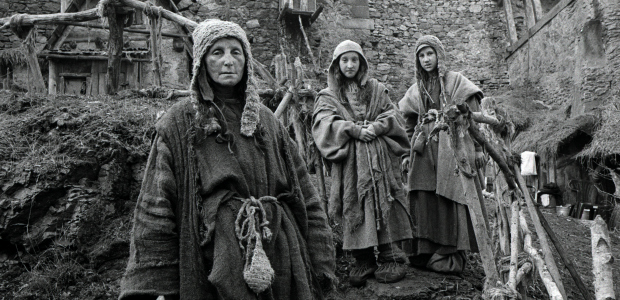Hard To Be A God
Stunning, in the passionately non-colloquial use of the word, and a remarkable achievement.
Plot summary
A group of scientists is sent to the planet Arkanar to help the local civilization, which is in the Medieval phase of its own history, to find the right path to progress.

Hard to Be a God, the hefty final film of Aleksei German, over 13 years in the making (shooting intermittently between 2000 and 2006, and in post up until the day he died, in 2013), is all wet, but decidedly not in the colloquial sense—it is moist. Dripping. Oozing. Fluids are poured, leaked, or spewed; rain is ever-present, saliva is ever-spat, piss arcs and dribbles. As does snot, vomit, intestinal bile, and phlegm. Garbage, shit, offal, additionally, are thrown in from off-screen.
Finding the plot in the swirl of excreta and sputum is not the easiest fig to pick—the rambling of lunatics is given as much screen prominence as what may be expositional dialogue if we were paying attention, which is hard with all the goo flying at us. The title cards (it’s based on 1964 sci-fi novel by Arkady and Boris Strugatsky) tell us that is not Earth, but another planet like Earth called Arkanar, that is basically 800 years behind us, one that missed a renaissance and is therefore stuck, viscously so, in the Dark Ages. Enlightenment was fluke of Earth, just like the opposable thumb was a fluke for the homo sapiens. It didn’t have to happen, and without a few good men, it never would have. Pigs grunting in a sty are without their poets. So a group of scientists travel to Arkanar to do good Russian science—to observe, but not interfere. Don Rumata (Leonid Yarmolnik) leads the scientists as they try to help the few indigenous intellectuals not get killed.
But, of course, as Margaret Mead learned (or, posthumously, her estate did), the mere fact of observing can alter what is being observed. Just because you’re living with a passel of adolescent girls in Borneo doesn’t mean they’re not necessarily going to be taking the piss. (Even Star Trek had its Prime Directive, which forbade all Star Fleet crew from interfering with the internal development of any alien civilizations. Unless, of course, if you were some hot alien chick who couldn’t resist a shapely Captain Kirk, but then you’d have to die. But it would have been worth it.) This is the observer paradox. Russians fall out of the sky and you’re supposed to go on with your medieval life as though nothing has happened? Christ, they used to set fire to virgins at the sight of comet, so I doubt it. But Don Rumata and his scientific comrades seem not to pay any mind to Margaret Mead or Captain Kirk. They don’t even bother with the pretense of distanced dispassion of empirical resolve and non-involvement. Maybe they’ve just gone native, maybe they’ve just stumbled into the heart of darkness, or maybe they’ve merely gone undercover, trying to make themselves comprehensible to the backward locals. They’ve certainly adopted the indigenous habit (necessity?) of spitting. Or perhaps they introduced it to the natives, like conquistadors bringing smallpox. In any case, every scene has someone hawking up a foamy ball of expectoration. They are willful and hedonistic players; when they’re considered supernatural, superstition-infused supermen, warriors, priests, whatever, they don’t correct. They become feudal, not averse to promulgating slavery, if it makes their lives easier, raping, ruling, beheading as they go along. It’s about as empirically observed as vomiting in a petri dish. It’s hard to be a god.
The stakes are, of course, very low, the organization too haphazard to matter. It’d be like trying to be a political operative in a monkey house. It’s visceral, too baldly simian, too basic bodily functional, to think of any political machinations and power plays as anything but the wooden sword play of young boys playing in the mud. They’re not mean, just gleeful bullies; if they see a face, they’ll slap it, if they see someone walking by with a laden tray, they’ll leave a conversation to go and kick it out of the carrier’s hands, and then return to what they were saying. But likewise, they have food pulled out of their own mouths and are sworn at.
The restless camera is present, but not present, stopping punkishly behind some obstruction that will block our view, or suddenly a peasant notices and runs up inquisitively to stare into the lens, or to mug. Some say ‘hello.’ Some moon the camera. At one point someone pops up some severed chicken feet into the frame, and makes them clap, some like bratty teenager pulling faces behind a TV reporter on location.
Human battering rams, donkey erections, bloated beast carcasses, and monks that seem to worship fish: it’s Fellini’s Satyricon left to rot, Peter Greenaway’s Prospero’s Books with cess. And it’s not a film for vegans, PETA members, or sufferers of coprophobia. Fun and yucky, it’s like a live action Bosch panel (the right-hand one).
Hard To Be A God is stunning, in the passionately non-colloquial use of the word, and a remarkable achievement. It’s unlike anything you’ve seen before (unless there’s some fetish niche of snot porn that I haven’t stumbled across yet).










COMMENTS